
Surrounded by friends and family is a boon. But there are times when we suffer peril times. During such adverse situations, we expect to speak with someone. We wish to find a solution by expressing to a person who will listen. But what if the person you are sharing your feelings with, doesn’t respond? And that’s when you wish that a good listener should be by your side. Especially someone with good critical listening skills.
Studies reflect that an average person utilizes only 25% of efficiency in listening. But a good listener is an exception to this scenario. An individual with good listening skills is capable of convincing and inspiring. Moreover, these skills boost productivity as well as suppress misunderstandings and conflict. And this reflects how listening plays a crucial role while communicating. Amidst this, there are various types of listening. However, critical listening tops the chart.
So, let’s explore more about critical listening.
Critical Listening Definition
Critical listening helps in examining assumptions, and other information. In this type of listening, a listener undertakes systematic thinking and reasoning. With this, the listener derives that whether the speaker’s message holds any evidence. Individuals with critical listening do not adhere to illogical arguments based on opinions. They examine facts to assess the argument put forth by the speaker. And that’s why it involves problem-solving or making a decision.
Besides, critical listening can be difficult for some to practice. Because some people tend to take every message to their face value unbeknownst of facts. Besides, some speakers design complex messages to avoid critical scrutiny. For example, an employee while giving a presentation might use complex words or include technical jargon. With this, the ability to listen minimizes, while giving no room to ask probing questions
Thus, to help such individuals, we are listing a few tips for effective critical listening. With this, evaluating the messages may become a bit easier.
5 Ways to Improve Your Critical Listening Skills
1. Stay away from distractions

SUMMARY
Being attentive plays a pivotal role in critical listening. But while doing so, stay relaxed. Sometimes, you may look away but stay focused. Don’t lose track because of distractions.
Mobile phones, television, laptop are the biggest hurdles while striking communication. If you wish to undertake critical listening, then stay away from these distractions. Also, your thoughts, feelings, or judgment can turn into a distraction. So, be attentive while listening to every word. Besides, maintain eye contact for effective communication. This proves that you are focused on what the speaker is saying.
TIP
Also, do not pay attention to the person’s mannerism, body language, accent, tone, facial expression or gesture. They can distract you from listening.

2. Don’t make judgments
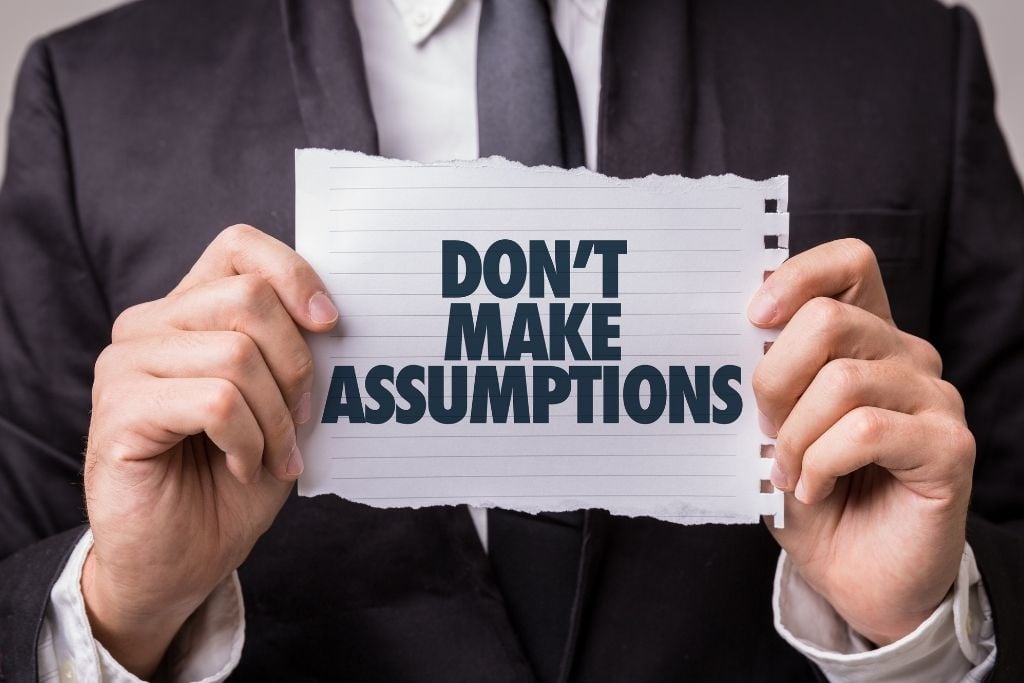
SUMMARY
It is imperative to reason as you listen. While doing so, collect key information, concepts, and categorize questions. Concentrate on facts and not assumptions.
Whatever the speaker says, do not make a judgment on half-baked knowledge. If something surprises you, then keep it to yourself. But there’s no need to blurt it out which in turn insults the speaker. Remember, the speaker has faced some situations. Innumerable thoughts and feelings are going on in his/her head. And their evaluation is possible only with listening.
3. Know their perspective
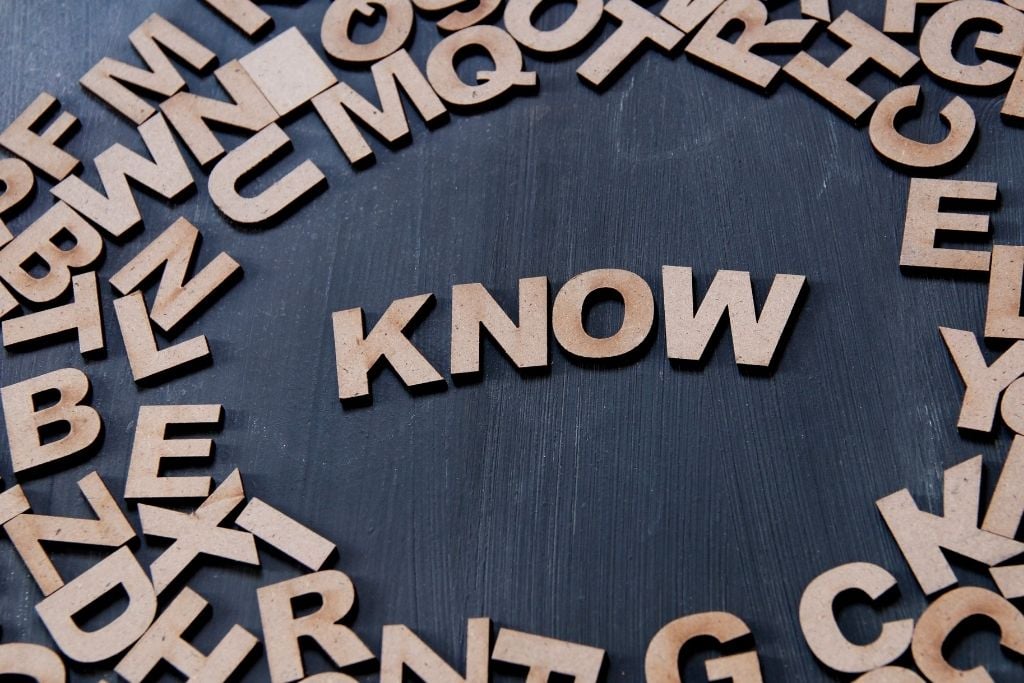
SUMMARY
The words of the speaker might not interest you. But whatever they are saying, is important for them as a person. Your listening skills might give them relief or help them solve a problem.
You might not agree with what the speaker is saying. You might have a conflict of interest. But it is important to know their perspective. Try and keep yourself in their situation. Draw a picture of the information communicated to you. Think about their life, challenges, and background to draw a better conclusion. If a speaker is sad, then convey your feelings with appropriate expression. Empathy is an important skill for good listening.
TIP
At any point, you think you are getting bored. Then, immediately start refocusing to enhance your critical listening skills.
4. Don’t bombard with senseless questions

SUMMARY
It is rude to interrupt a speaker with baseless questions. This may send a wrong message to the speaker about your intentions.
Do not ask unimportant questions. Questions are important to draw an accurate conclusion. But ask in a way that they help you to boost your understanding of the situation. For example, if an employee is narrating about his/her confrontation with the boss. Then don’t interrupt and start narrating about your family trip. It is baseless to drift a conversation.
And if you are a good critical listener then make sure to get the conversation back on track. Amidst this, wait for the speaker to take a pause and take your questions. With this, you will have room for shooting the right questions.
TIP
Focus on clarity. And for that ask questions till you achieve a clear understanding of the message. But let the speaker finish his/her side of the story. Do not interrupt a conversation and form a conclusion beforehand.
5. Give honest feedback

SUMMARY
Feedback exhibits your listening skills. When your mind knows that you have to give feedback. Then it becomes easier to focus on the speaker.
After the speaker winds up, give him/her honest feedback. Show them that you understand their feelings. This assures the speaker, that you are a good listener. Moreover, take notes while hearing the conversation. It will help in assessing your understanding and in acknowledging any incomplete information. Also, while giving feedback, summarize only the points that were mentioned. This will help in avoiding any confusion while making a decision.
Well, now you know ways to improve critical listening. So, let’s explore some examples to get clarity about critical listening.
Critical Listening examples
Many examples depict what critical listening is all about. Hereby, we are mentioning a few of them.
- Many people are keen on losing weight. So, they attend a seminar on weight loss. They keep a focus on the statements made by the speaker. Furthermore, they also concentrate on listening to understand weight gain. The speaker starts introducing products for weight loss. But the participants might think that are these products reliable? Besides, if they are critical listeners, then they might note unwanted assumptions. Especially made towards the products and the line of treatment. Thus, this attitude urges to probe questions, helping in clarifying doubts.
- If there are ongoing elections in a company. And the candidates choose to publicize with posters, videos, speeches or even banners. Amidst this, it becomes tedious to choose the best candidate. That’s when critical listening comes handy. As a critical listener, one will listen to their speech. Furthermore, making it easy to figure out illogical assumptions.
- Several people are fond of attending a public speaking event. No matter what the event might be, a listener always focuses on attempting to understand. Especially about the motto behind the event. However, not everything stated in the speech might be true. But how to confirm that? That’s when a critical listener steps in to assess the message. He/she analyzes the speech and figures out the context, to evaluate its authenticity.
Besides, as a critical listener, he/she will rely only on factual evidence to brush off the confusion. Thus, making the right decision.
Above all, if you are looking for more insight on critical listening, then do watch this video:
So, now you have a fair idea of critical listening. But did you know listening is somehow connected with critical thinking? Let’s find out how?
How listening is connected to critical thinking?
Despite nodding, yet a speaker has to make sure by asking the masses, “are you listening to me?”. Though the masses agree, some are clueless about the ongoing discussion. And that’s when critical thinking comes to the rescue. Critical thinking takes place when a person wants to figure out what to believe. Furthermore, helping in taking an action rationally and thoughtfully.
In critical thinking, a person subjectively and significantly evaluates the collected information. Thus, using the information for problem-solving and producing a productive conclusion. But for this, a critical thinker should participate in active listening. With such effective listening, they can comprehend, construe, and evaluate.
They can organize the information that they hear. They understand its background while separating unspecified assumptions. Further, it also helps in making logical connections between concepts. Besides, helping in deriving truth for a productive conclusion. Moreover, with effective listening, they can gather maximum relevant information. Thus, promoting critical thinking which in turn helps for smooth communication.
Before we sum up this article, sharing some inspirational quotes that will help become a good listener!
Critical Listening Quotes
Roy T. Bennett, an author, has beautiful words to sum this up.
1. “Listen with curiosity. Speak with honesty. Act with integrity. The greatest problem with communication is we don’t listen to understand. We listen to reply. When we listen with curiosity, we don’t listen with the intent to reply. We listen for what’s behind the words”
— Roy T. Bennett
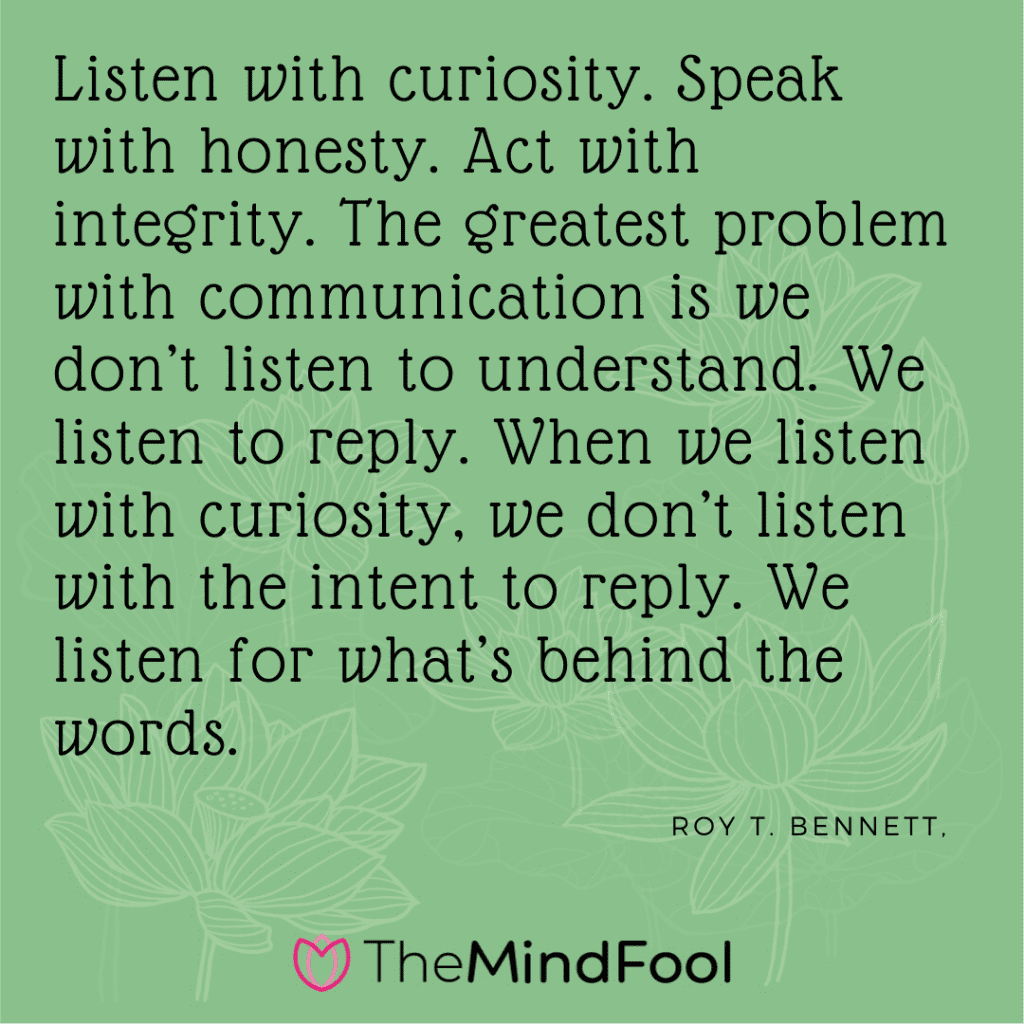
On the other hand, Jeanette Winterson, an English writer, has a different point of view altogether.
2. “Everything in writing begins with language. Language begins with listening.”
— Jeanette Winterson
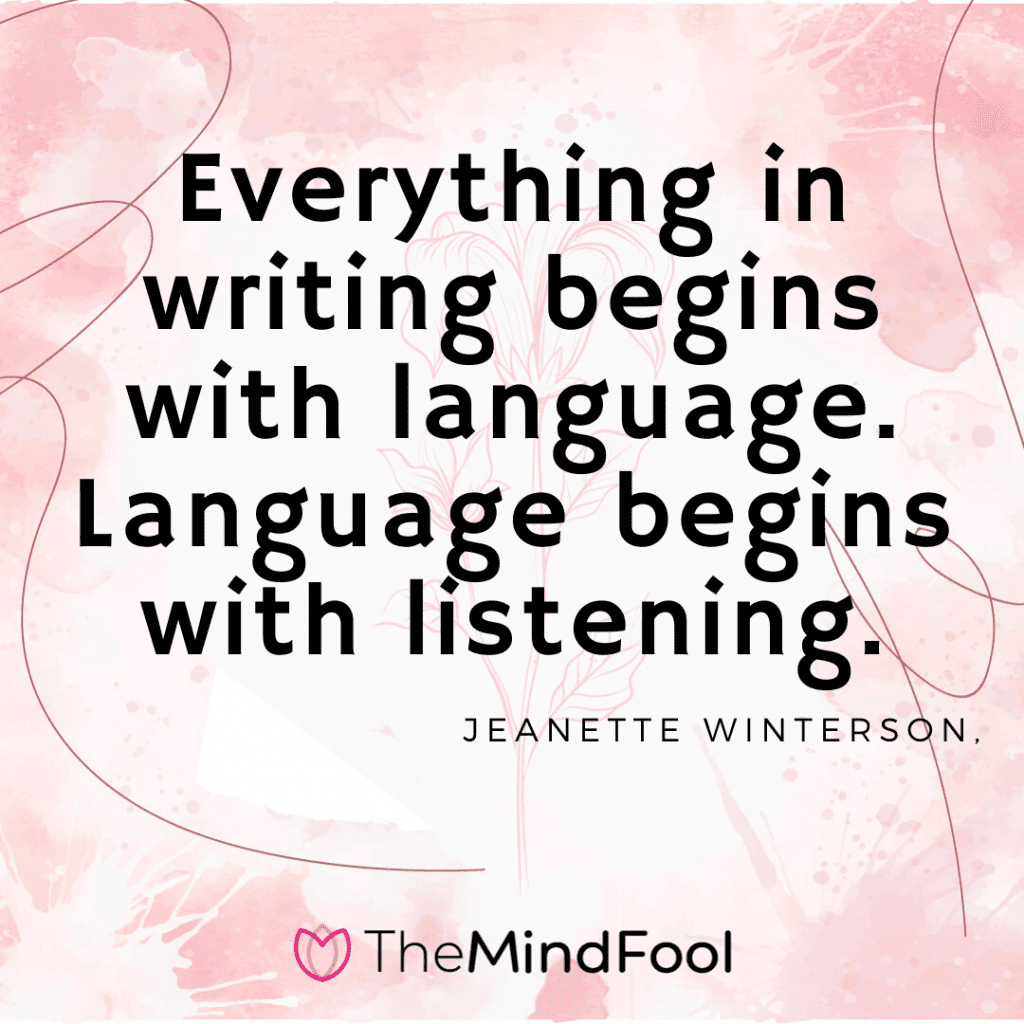
Last but not the least, columnist and Editor of Door County Advocate, Doug Larson has a beautiful take on this.
3. “Wisdom is the reward you get for a lifetime of listening when you’d have preferred to talk.”
— Doug Larson
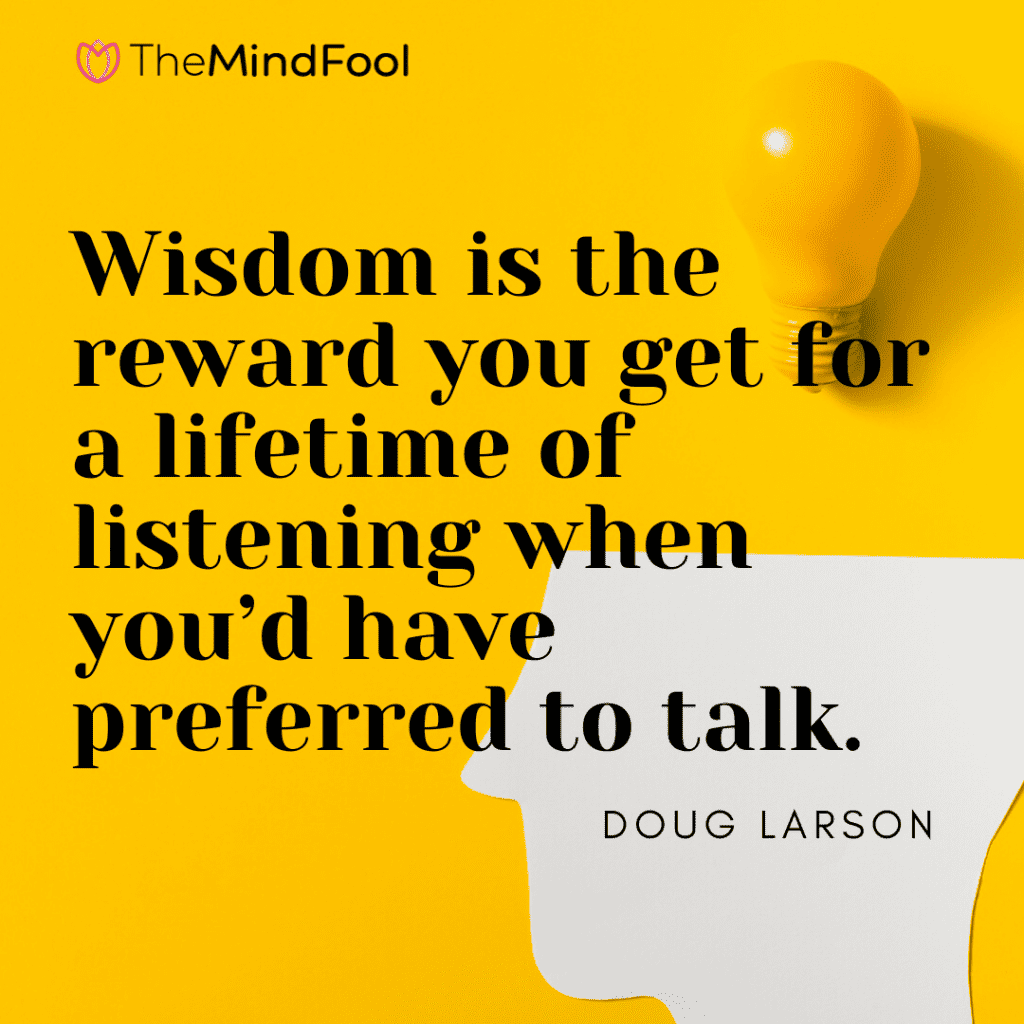
Frequently Asked Questions
There are majorly 6 types of listening skills. These are – discriminative, comprehensive, critical, therapeutic, appreciative, and relational listening. To improve your listening skills you must know about each of these listening skills.
The cause of poor listening is often ignorance about proper communication. There are four main reasons of poor listening:
1. Not concentrating on what is being said.
2. Listening casually and missing the details of the conversation.
3. Reaching to conclusions because of bias or indifference.
4. Focusing on the external aspect of the speaker like appearance or presentation.
The importance of critical listening is immense. Because when you listen critically you observe the facts spoken in a careful, unbiased manner. You do systematic thinking and use reasoning. As a result, you can analyze the information truthfully and draw the right conclusion.
Some of the major signs of good listener are –
1. They have empathy.
2. They do not react.
3. They ask follow up questions.
4. They use appropriate body language.
5. They appreciate the speaker.
The five good listening skills are –
1. Staying away from distractions while listening.
2. Not judging the other person.
3. To try and understand the speaker’s perspective.
4. Not asking senseless questions to the speaker.
5. Giving honest feedback at the end of the discussion.
Closing thoughts
Well, you have got a fair idea about critical listening. Also, we have mentioned some of the tips for improving critical listening skills. But only rigorous practice will make you perfect. Besides, continue to master the ability to listen by identifying loopholes in messages. With this, you will be able to interpret the accurate meaning of the speaker’s message.
Neelambari started her rollercoaster ride as a journalist at Pune Mirror (Times Group). After which she started exploring the world of content writing. Today, she boasts more than five years of experience filled with creativity and diversity. During this tenure, she explored various mediums like articles, blogs, social media posts, website content, and much more. And this content ranged from Gynecology, Ayurveda, Dental health to nutrition. However, she enjoys the most writing about Psychology and other medical streams. She loves writing and aims to bring positive changes at least in some lives with her articles on www.themindfool.com
